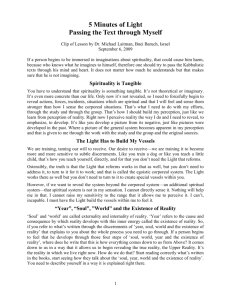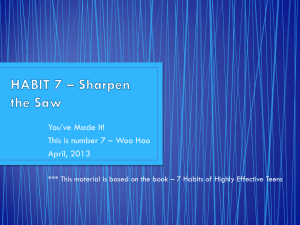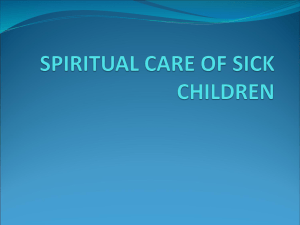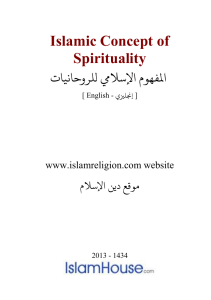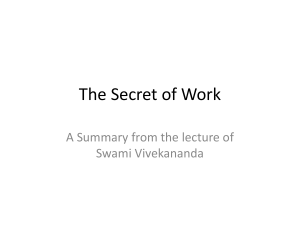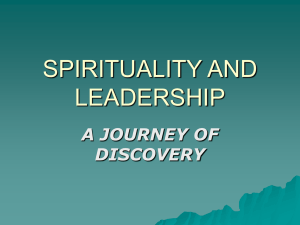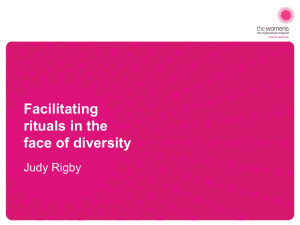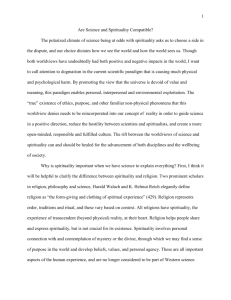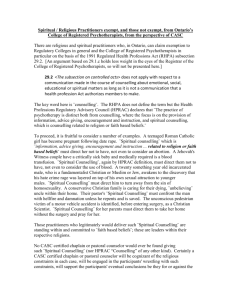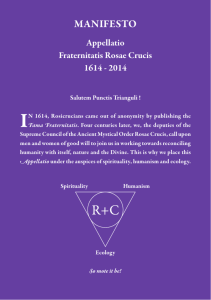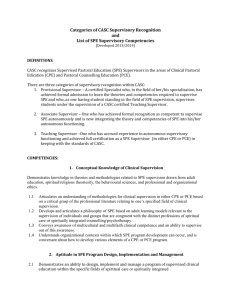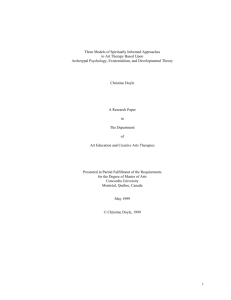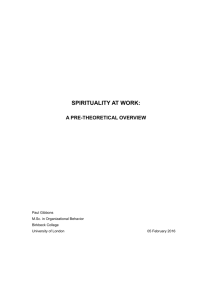Tony McLaren, National Director, Breathing Space Scotland
advertisement
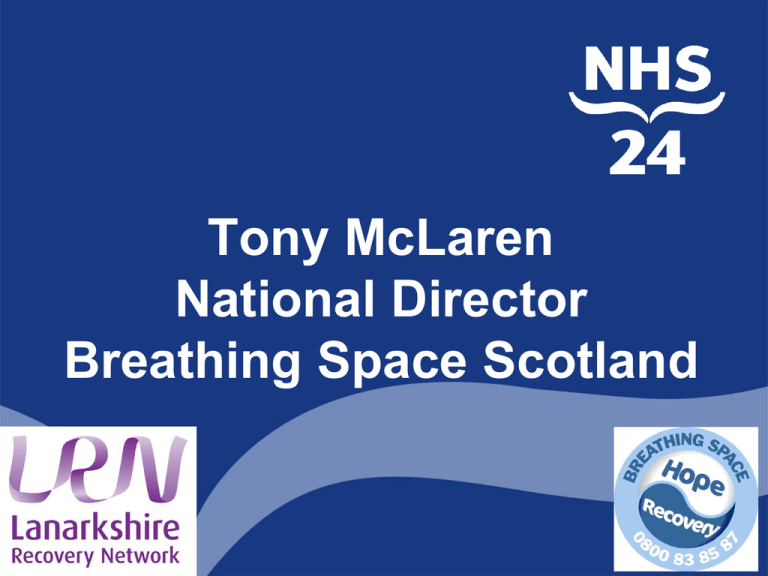
Tony McLaren National Director Breathing Space Scotland BS Presenting Issues • • • • • • • • • • • • • • Depression Relationship difficulties Alcohol and drugs Gender Identity/Sexuality Self-harm Exam anxiety Abuse Debt Unemployment Prison Issues Bullying Mental Health Problems Isolation & Loneliness Spiritual/Existentialist Mental Health ‘Essentially about how we think and feel about ourselves and about others and how we interpret The world around us ... it also affects our capacity to cope with change and transitions such as life Events ... mental health may be central to all Health and well-being’ Rankin (2005) Models of Mental Illness • Biological Models – concerned with the biological and chemical basis of mental illness i.e. medical model • Social or psychological models that are concerned with life events, family dynamics, belief systems or thinking styles • Intuitive or spiritual explanations that see the mind as a battleground for conflicting forces. The conscious v the unconscious….. good versus evil etc. • Existential belief which views mental illness as another form of human existence (this is rare) McCulloch (2006) Spirituality ‘Spirituality is a distinctive, potentially creative and universal dimension of human experience arising both within the inner subjective awareness of individuals and within communities, social groups and traditions. It may be experienced as relationship with that which is intimately “inner” ... and personal ... and/or as a relationship with that which is wholly “other”, transcendent and beyond the self. It is …. Concerned with matters of meaning and purpose in life, truth and values.’ Cook et al, 2009, p4 Spirit/Soul Inner Spirit: In the West we base a great deal of our knowledge from the ancient Greeks. Plato stated (428BC) ‘As you ought not to cure the eyes without the head, or the head without the body; so neither ought you to attempt to cure the body without the soul, because the part can never be well unless the whole be well.’ Spirit/Soul • Hindu: Bhagavad Gita talks about ‘that which pervades the entire body with consciousness, you should know to be indestructible. No one is able to destroy that imperishable soul • Spirit and soul can be used interchangeably by some but in the Jewish faith these are distinct • For Muslims Allah is said in the Qur’an to breathe Allah’s ‘ruh’ into each human being • As Scotland becomes ever more multicultural then understanding varied and perhaps interlocking models of spirituality will become increasingly important in working with the whole person. Religion The word religion derives from the Latin word meaning ‘binding obligation’ and this demonstrates how much it has to do with a sense of community. Belief in something sacred (for example, gods or other supernatural beings). Characteristically religious feelings (awe, sense of mystery, sense of guilt, adoration), which tend to be aroused in the presence of sacred objects and during the practice of ritual and liturgy. Religious communities can be welcoming, integrative and supportive. They can give people a sense of belonging as well as a feeling that a benevolent god or powerful entity is looking after you. Love and forgiveness is demonstrated in many communities, but some can be exclusive, hurtful and stigmatising of people experiencing mental ill health. Religion can be over controlling, overly paternalistic, male dominated and homophobic. BS Mission Statement Breathing Space is a free, confidential phone and web based service for people in Scotland experiencing low mood, depression or anxiety. We are here in times of difficulty to provide a safe and supportive space by listening, offering advice and information. It is our belief and hope that by empowering people they will have the resources to recover. Recovery ‘Recovery is being able to live a meaningful and satisfying life, as defined by each person, in the presence or absence of symptoms. It is about having control over and input into your own life. Each individual’s recovery, like his or her experience of the mental health problems or illness, is a unique and deeply personal process.’ www.scottishrecovery.net HOPE Hope is widely acknowledged as key to recovery. There can be no change without the belief that a better life is both possible and attainable. One way to realise a more hopeful approach is to find ways to focus on strengths. www.scottishrecovery.net HOPE We all find meaning (and hope) in very different ways. Some people may find spirituality important, while others may find meaning through employment or the development of stronger interpersonal or community links. Many people describe the importance of feeling valued and of contributing as active members of a community. www.scottishrecovery.net HOPE and EXPECTANCY • Hope and Expectancy as an essential ingredient in therapeutic change and necessary for life • Hopelessness can retard recovery or even hasten death, while mobilisation of hope plays an important part in many forms of healing • Hope at times seems to appear from outside oneself….something that is given • Something that is sought and uncovered. It pre-exists but rather than being imparted we may help to unearth the hope that lies dormant • Is it something that is constructed with the client? In constructing a new narrative can we become a co-creator of hope? • Self actualising tendency/drive • Engendering hope is one of the essential tasks of therapy (Dr Dennis O’Hara, Abertay, 2011) Faith as a protective factor • Religion and Suicide: Exploring the role of the church in deaths by suicide in Highland, Scotland (H. Mowat, J. Swinton, C. Stark and D. Mowat) • The importance of multidisciplinary education for ministers and the potential for parish nursing as a mechanism for connectedness Faith as a protective factor • The Scottish Development Centre for Mental Health, in partnership with the University of Edinburgh (Research Unit in Health, Behaviour and Change and General Practice Section) and the University of Stirling (Department of Applied Social Science and Department of Nursing and Midwifery), were commissioned by the then Scottish Executive to undertake a review of the literature on risk and protective factors for suicide and suicidal behaviour. (2008) • There is a wide range of evidence to suggest that religious participation may be a protective factor against suicidal behaviour. Other factors, such as the observance of traditional cultural rituals, may have very strong protective effect. The manner in which individuals relate to their God (in terms of religious coping style or private versus public expressions of religiosity) may further highlight different levels of protective factors within a single religious community. Faith and Counselling • Talking Therapy: Dialoguing about counselling and pastoral care in the context of changing landscape of Faith and Spirituality in Scotland University of Edinburgh 2 year research ‘Impact of Counselling in Scotland 1945 - 2000’ • Counselling and Psychotherapy can be understood as practices of meaning making. People may bring similar questions to the counselling room as they bring to the church, mosque, temple or other spiritual or religious settings…’what is the meaning of life?’ Approaches with Spiritual Orientations • Dialectic Behaviour Therapy: BPD Standard CBT developed for Buddhist meditation practice. Meditative exercises • Cognitive Analytic Therapy: Mindfulness and imaging techniques used with a spiritual approach • Mindfulness: Pay attention non-judgementally to the present moment. Programme involves intensive training in mindfulness meditation together with discussion on stress and life skills • Recovery: Not a psychological approach but a focus on the whole person • Transpersonal Psychotherapy: ‘Concerned with the study of humanity’s highest potential and with the recognition, understanding and realisation of spiritual and transcendent states of consciousness.’ Lajoie Shapiro 1992 • Positive Psychology; not simply to treat mental illness but to find, nurture and to make normal life more fulfilling. Talks about flow and spirituality and the key place of hope. Associated with following and practising a spiritual tradition. • Western theories of counselling and psychotherapy have largely ignored the importance of the spirit the soul and the transcendent (Cortright, 1997) Last word…. ‘To work with people in an effective and cost effective way we need to connect with the whole person in the context of their whole life. This includes their family, social groups, community, housing, employment and leisure time.’ Gilbert (2010) ‘Our experience in therapy and groups involves the transcendent, the indescribable, the spiritual. I am compelled to believe that I, like many others, have under-estimated the importance of the mystical, spiritual dimension.’ Rogers, C. A Way of Being (1980)


